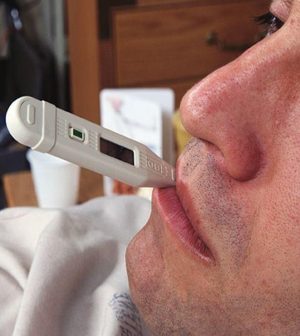- Recognizing the Signs of Hypothyroidism
- 10 Strategies to Overcome Insomnia
- Could Artificial Sweeteners Be Aging the Brain Faster?
- Techniques for Soothing Your Nervous System
- Does the Water in Your House Smell Funny? Here’s Why
- Can a Daily Dose of Apple Cider Vinegar Actually Aid Weight Loss?
- 6 Health Beverages That Can Actually Spike Your Blood Sugar
- Treatment Options for Social Anxiety Disorder
- Understanding the Connection Between Anxiety and Depression
- How Daily Prunes Can Influence Cholesterol and Inflammation
No Need for Blood Thinners in Patients Sick at Home With COVID-19

Early in the pandemic, doctors began to note a heightened risk of sometimes deadly blood clots in people hospitalized with severe COVID-19, and they routinely began to prescribe blood thinners in these cases.
Is the same intervention needed for people sick at home with milder forms of COVID?
No, according to the results of a clinical trial whose results appeared so conclusive that the trial was stopped early.
The risk of symptomatic blood clots, heart attack, stroke and other major cardiopulmonary complications among patients with milder COVID-19 is so low that the use of blood thinners in these patients can’t be justified, the new study found.
The findings are “really good news for the millions of people who are managing mild, stable symptoms of SARS-CoV-2 infections at home,” trial chair Dr. Paul Ridker, director of the Center for Cardiovascular Disease Prevention at Brigham and Women’s Hospital in Boston, said in a hospital news release.
The research was funded by the U.S. National Heart, Lung, and Blood Institute.
One expert in the care of COVID-19 patients called the findings “very important.”
“We have been waiting for these results,” said Dr. Mangala Narasimhan, who directs critical care services at Northwell Health in New Hyde Park, N.Y. “This study shows us that patients with mild COVID-19 who are treated at home are not at higher risk of clots than normal people and we do not need to treat them with medications to prevent clots. The risks of using these medications are greater than the benefit in this patient population.”
“This will change the way that we treat mild COVID-19 for the majority of the patients with this disease,” she added.
The new study included mildly symptomatic but “clinically stable” COVID-19 patients who’d been sick at home for at least a week and had no risk factors for blood clots.
They were randomly assigned to receive 45 days of treatment with either a preventive dose of the blood thinner pill Apixaban (2.5 milligrams twice per day); a therapeutic dose of Apixaban (5 mg twice a day); low-dose aspirin (81mg once a day); or a placebo twice a day.
Over the 45 days of the study, “there have only been a handful of hospitalizations for COVID-related pneumonia and no thromboembolic [clotting] events among the participants enrolled and taking study medications,” according to a news release from Brigham & Women’s.
Because blood thinners come with their own risks for bleeding, that finding led the study’s oversight board to recommend that the trial be ended, leading to a halt of patient enrollment.
However, the researchers said they will continue to follow the study participants. The results have yet to be published, but Ridker’s group said they will undergo further analysis and be submitted for publication in a peer-reviewed journal.
“We regularly receive questions from physicians caring for mildly symptomatic outpatients about the best pathway forward for these extremely common patients,” said Dr. Jean Connors, trial principal investigator and a hematologist at Brigham and Women’s Hospital. “For those a week or more past the time of COVID-19 diagnosis who are clinically stable and do not have other risk factors, our data show the best course of action is likely not to treat with anti-thrombotics [blood thinners] unless there are other indications for such treatment.”
More information
The American Society of Hematology has more on blood clots.
SOURCES: Mangala Narasimhan, DO, director, critical care services, Northwell Health, New Hyde Park, N.Y.; Brigham and Women’s Hospital, news release, June 22, 2021
Source: HealthDay
Copyright © 2026 HealthDay. All rights reserved.










